For the 2025 school year, there is 1 public preschool serving 336 students in Baboquivari Unified School District #40 (4412). This district's average pre testing ranking is 1/10, which is in the bottom 50% of public pre schools in Arizona.
Public Preschool in Baboquivari Unified School District #40 (4412) have an average math proficiency score of 5% (versus the Arizona public pre school average of 35%), and reading proficiency score of 8% (versus the 40% statewide average).
Minority enrollment is 100% of the student body (majority American Indian), which is more than the Arizona public preschool average of 67% (majority Hispanic).
Overview
This School District
This State (AZ)
# Schools
6 Schools
841 Schools
# Students
1,057 Students
395,515 Students
# Teachers
73 Teachers
23,860 Teachers
Student : Teacher Ratio
14:1
14:1
District Rank
Baboquivari Unified School District #40 (4412), which is ranked within the bottom 50% of all 607 school districts in Arizona (based off of combined math and reading proficiency testing data) for the 2021-2022 school year.
The school district's graduation rate of 45-49% has decreased from 60-64% over five school years.
Overall District Rank
#629 out of 631 school districts
(Bottom 50%)
(Bottom 50%)
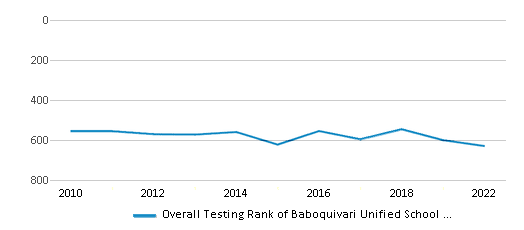
Math Test Scores (% Proficient)
2%
35%
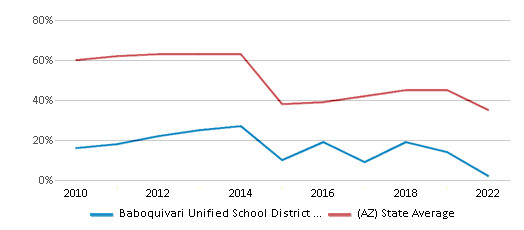
Reading/Language Arts Test Scores (% Proficient)
7%
40%
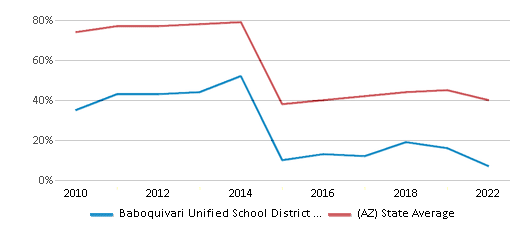
Science Test Scores (% Proficient)
≤5%
24%
Graduation Rate
45-49%
77%
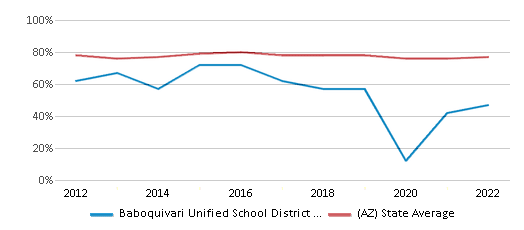
Students by Ethnicity:
Diversity Score
0.19
0.64
# American Indian Students
946 Students
17,006 Students
% American Indian Students
90%
4%
# Asian Students
9 Students
9,623 Students
% Asian Students
1%
3%
# Hispanic Students
98 Students
195,352 Students
% Hispanic Students
9%
49%
# Black Students
n/a
22,513 Students
% Black Students
n/a
6%
# White Students
1 Student
131,530 Students
% White Students
n/a
33%
# Hawaiian Students
n/a
1,496 Students
% Hawaiian Students
n/a
n/a
# Two or more races Students
3 Students
17,995 Students
% of Two or more races Students
n/a
5%
Students by Grade:
# Students in PK Grade:
35
20,476
# Students in K Grade:
62
45,750
# Students in 1st Grade:
76
49,579
# Students in 2nd Grade:
89
52,288
# Students in 3rd Grade:
74
49,880
# Students in 4th Grade:
83
51,327
# Students in 5th Grade:
99
49,953
# Students in 6th Grade:
76
37,491
# Students in 7th Grade:
72
18,851
# Students in 8th Grade:
55
19,086
# Students in 9th Grade:
77
56
# Students in 10th Grade:
83
82
# Students in 11th Grade:
60
63
# Students in 12th Grade:
116
168
# Ungraded Students:
-
465
District Revenue and Spending
The revenue/student of $20,249 is higher than the state median of $11,421. The school district revenue/student has declined by 9% over four school years.
The school district's spending/student of $20,071 is higher than the state median of $11,323. The school district spending/student has declined by 9% over four school years.
Total Revenue
$21 MM
$12,837 MM
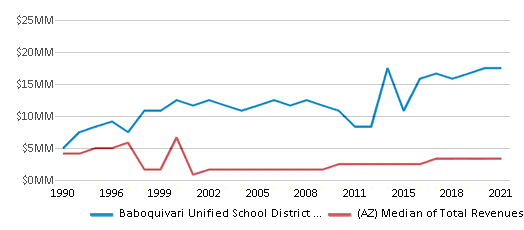
Spending
$21 MM
$12,727 MM
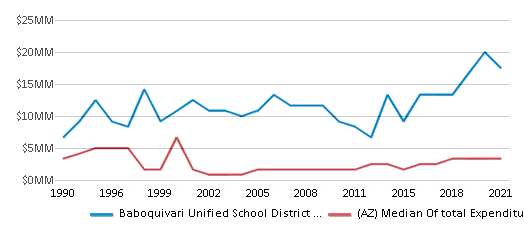
Revenue / Student
$20,249
$11,421
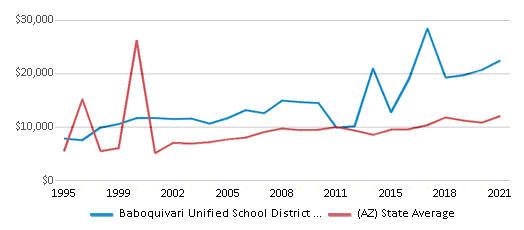
Spending / Student
$20,071
$11,323
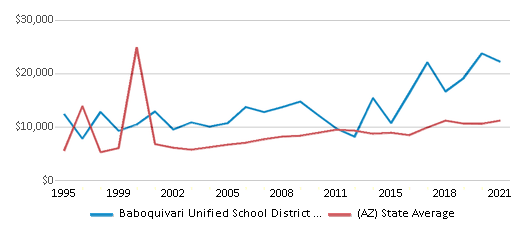
Best Baboquivari Unified School District #40 (4412) Public Preschools (2025)
School
(Math and Reading Proficiency)
(Math and Reading Proficiency)
Location
Grades
Students
Rank: #11.
Indian Oasis Primary Elementary School
(Math: ≤5% | Reading: 6-9%)
Rank:
Rank:
1/
Bottom 50%10
111 W. Main
Sells, AZ 85634
(520) 719-1230
Sells, AZ 85634
(520) 719-1230
Grades: PK-3
| 336 students
Recent Articles

Year-Round Or Traditional Schedule?
Which is more appropriate for your child? A year-round attendance schedule or traditional schedule? We look at the pros and cons.

Why You Should Encourage Your Child to Join a Sports Team
Participating in team sports has a great many benefits for children, there is no doubt. In this article you will learn what those benefits are.

White Students are Now the Minority in U.S. Public Schools
Increasing birth rates among immigrant families from Asia and Central and South America, combined with lower birth rates among white families, means that for the first time in history, public school students in the United States are majority-minority. This shift in demographics poses difficulties for schools as they work to accommodate children of varying language abilities and socio-economic backgrounds.





